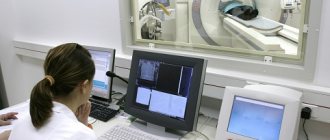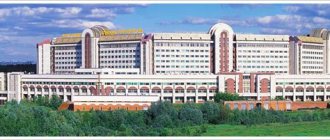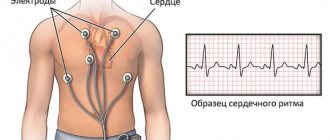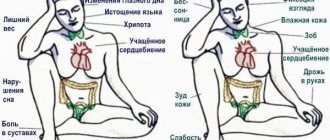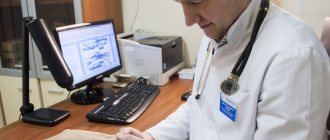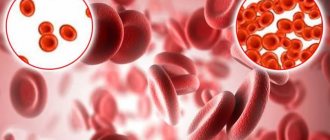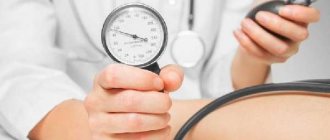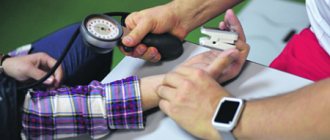About the study
The technique is one of the most informative and accurate examinations that allows diagnosing coronary heart disease with determining the location and nature of the lesion in the coronary arteries.
Coronary angiography is used in various clinical cases for the following purposes:
- coronary blood flow assessments;
- identification of areas of narrowing of the coronary arteries;
- choosing a method for revascularization of stenotic coronary arteries - coronary stenting (percutaneous coronary intervention) or coronary artery bypass grafting;
- assessing the results of coronary artery stenting or coronary artery bypass grafting (bypass patency);
- preparation before heart surgery.
Coronary angiography is used to determine areas of vascular narrowing and the extent of their narrowing by atherosclerotic plaques.
The advantages of the method include:
- information content – allows you to obtain a full amount of data on the condition of the coronary arteries;
- efficiency - the accuracy of the results allows you to quickly and correctly diagnose and prescribe the correct treatment in a timely manner;
- speed of implementation - the study takes 20-30 minutes;
- the examination is carried out through a puncture under local anesthesia, the patient is conscious and can communicate with the doctor;
- relative safety - during the study, the risk of complications is extremely low (bleeding at the puncture site, heart rhythm disturbances, development of myocardial infarction, arterial thrombosis, allergic reaction to contrast);
- rapid rehabilitation - the patient can be discharged the very next day after coronary angiography.
How to get to the Bakulev Center
- From the Molodezhnaya metro station on the Arbatsko-Pokrovskaya line, visitors will get to the Institute of Cardiac Surgery named after. IN AND. Burakovsky by bus or minibus No. 127, No. 626, getting off at the stop. "Cherepkovo" or by bus No. 660, going to the stop. "Institute named after Bakulev."
- It is also convenient to get here from the Shchukinskaya metro station of the Tagansko-Krasnopresnenskaya line by bus or minibus No. 798, get off at the stop. "Institute named after Bakulev."
- You can also get to the institution by trains in the Belorussian direction, following to the Rabochy Poselok platform, then by bus No. 127 to the Cherepkovo stop, then go to the opposite side of Rublevskoye Shosse and walk along 3rd Cherepkovskaya Street.
- From the Moscow Ring Road, visitors can get here by car by following the Rublevo-Uspenskoye Highway, then turning right onto 3rd Cherepkovskaya Street and driving along it for about 550 meters to the institute building.
Institute of Coronary and Vascular Surgery - directions
Institute of Cardiac Surgery named after. V. I. Burakovsky - directions
- From Art. Krylatskoye metro station (stop Marshal Timoshenko Street) by buses 626, 129, 127. Go to the stop - Cherepkovo. Go through the underground passage across Rublevskoye Highway. Go up the path to the NCSS building and enter the territory. Entrance through the entrance in the central part of the Polyclinic building. 560 m.
- From Art. M. Molodezhnaya take bus number 660. Go to the stop - Bakulev Institute. The stop is located opposite the entrance to the territory. Go to the central part of the building. Entrance to the entrance with the inscription “Polyclinic”. 180 m
Indications for coronary angiography
Coronary angiography can be performed routinely or on an emergency basis. The main indications for the examination are:
- acute coronary syndrome, myocardial infarction, unstable angina
- suspicion of coronary heart disease;
- clinical manifestations of angina pectoris that cannot be treated with medications;
- preparation for heart surgery for heart defects;
- choice of treatment method for coronary heart disease - bypass surgery or stenting of the coronary arteries, or drug treatment;
- preoperative preparation for surgery to eliminate problems with cardiac rhythm.
Sometimes coronary angiography is advisable in the case of diagnosis at the first suspicion of coronary heart disease, when other diagnostic methods do not allow excluding or confirming the presence of this disease.
Alexander Bakulev
The founder of the center, Bakulev, is a famous surgeon scientist who is considered one of the founders of cardiovascular surgery in the Soviet Union. He was awarded the Lenin Prize and received the title of Hero of Socialist Labor. The future cardiologist was born in 1890 in a small village in the Kirov region. His relatives were representatives of the ancient Vyatka family of Bakulevs.
After studying at the First Vyatka Gymnasium, he graduated from the medical faculty of Saratov University in 1915. Bakulev took part in the First World War, serving for more than two years as a doctor on the Western Front. For participation in a dangerous intelligence operation he was awarded the Order of St. Stanislaus, third degree.
In 1919, he began working as a resident at a surgical clinic headed by Sergei Ivanovich Spasokukotsky. Since 1926, he worked at the Department of Surgery of the Second Medical Institute, which he headed in 1943.
His direct professional activity was related to bone surgery, kidney surgery, tumors of the lungs and mediastinum, and treatment of peptic ulcers.
In 1948, Alexander Nikolaevich Bakulev performed surgery on a congenital heart defect, becoming one of the founders of neurosurgery in the Soviet Union.
From 1953 to 1960 he headed the Academy of Medical Sciences of the USSR, and was a deputy of the Supreme Council for three convocations. He was a close friend of Alexander Nikolaevich Poskrebyshev, Joseph Stalin’s secretary.
In 1967, Bakulev died at the age of 76. He was buried in the capital at the Novodevichy cemetery.
Contraindications
Sometimes coronary angiography is advisable in the case of diagnosis at the first suspicion of coronary heart disease, when other diagnostic methods do not allow excluding or confirming the presence of this disease.
Coronary angiography has a number of limitations. Among the main contraindications to the examination are:
- peptic ulcer of the stomach and duodenum in the acute phase;
- gastrointestinal bleeding;
- severe forms of renal failure;
- cerebral stroke in the acute phase;
- decompensated respiratory diseases;
- pulmonary hemorrhage;
- blood coagulation disorder;
- acute infectious diseases;
- uncontrolled increase in blood pressure;
- severe forms of diabetes mellitus, anemia and electrolyte disturbances;
- mental disorders;
- hyperthyroidism.
There are no absolute contraindications to coronary angiography, if it is indicated, especially in acute coronary syndrome.
Coronary angiography is prescribed by a doctor after a detailed study of the patient’s health condition and the risk of complications has been eliminated. Most restrictions are temporary, as they can be corrected through treatment. The procedure becomes possible immediately after they are eliminated.
Management
Since 1994, the Center has been headed by Doctor of Medical Sciences, Academician of the Russian Academy of Medical Sciences and the Russian Academy of Sciences Leo Antonovich Bokeria. This is a famous domestic doctor who heads the public organization “League of Health of Nations”.
Throughout his many years of work, he used advanced and experimental treatments. He performed many operations using advanced methods, which then became popular and in demand not only in Russia, but also abroad.
For example, he actively uses computer methods for modeling the pathology of the circulatory system, arrhythmia, gas exchange, and diagnostics. He is considered the founder of the newest direction of clinical medicine, which consists of surgical treatment of cardiac arrhythmias. In 1980, he created the country's first specialized tachyarrhythmia department, introducing electrophysiological diagnostic methods into medical practice.
Currently, Boqueria pays increased attention to protecting the professional safety of doctors, including those who represent risky specialties. He sees his main task in this area as the need to create an effective system of legal regulation in the field of healthcare
Preparing for the coronary angiography procedure
The patient undergoes coronary angiography only after special preparation for the procedure. First, the patient must undergo several clinical and laboratory examinations to assess the state of the cardiovascular system and health in general.
Preparation for the study includes:
- general and biochemical blood tests (total protein, creatinine, urea, total bilirubin, direct bilirubin, glucose, pancreatic amylase);
- determination of blood group, Rh factor;
- expanded coagulogram;
- ADP platelet aggregation;
- markers of infections: HIV, hepatitis B, hepatitis C, syphilis;
- indicators Pro-BNP, CRP, troponin.
- Analysis of urine;
- electrocardiography;
- EchoCG;
- ultrasound examination of the heart;
- chest x-ray;
- EGDS – according to indications;
- Ultrasound scanning of the brachiocephalic arteries – according to indications;
- Ultrasound scanning of the arteries of the lower extremities - according to indications;
- Ultrasound scanning of the veins of the lower extremities - according to indications;
- according to indications - consultations with specialized specialists (neurologist, gastroenterologist, endocrinologist).
As part of the preparatory stage, the patient must adhere to a number of rules:
- in the morning before the procedure - you should stop eating any food that during the examination may provoke the development of vomiting;
- the hair at the catheter installation site must be shaved;
- For patients with diabetes mellitus, stop taking metformin 2 days before.
Coronary angiography is performed in a stable emotional state. This will prevent the risks of complications and normalize the functions of internal organs and systems, ensuring the normal course of all processes in the body. Therefore, before coronary angiography in the hospital, light sedation is performed (an anesthesia method in which the patient feels relaxed and calm).
If a doctor has prescribed a coronary angiography, you can sign up for a study and check the condition of the heart and blood vessels at the Federal Scientific and Clinical Center of the Federal Medical and Biological Agency at an affordable price in Moscow. We employ leading scientists and the best practical doctors. Patients of the center have access to advanced techniques and technologies in the field of cardiac surgery. You can also do the necessary tests and studies before coronary angiography in our center.
Carrying out coronary angiography
Coronary angiography is a type of angiography. Doctors regard it as a relatively safe, minimally invasive procedure. In Moscow, diagnostics are carried out by qualified specialists from the Federal Scientific and Clinical Center of the Federal Medical and Biological Agency of Russia, who have the necessary experience and skills in this field of activity.
The examination is carried out in a specially prepared operating room in which an angiograph is installed. At the Federal Scientific and Clinical Center FMBA, diagnostics are performed by experienced doctors - specialists in X-ray endovascular diagnostics and treatment. Every year, more than 1,500 coronary angiographies are performed at the Federal Scientific and Clinical Center of the Federal Medical and Biological Agency of Russia. The entire process of examining the coronary arteries occurs under the supervision of an anesthesiologist-resuscitator.
The duration of the procedure usually does not exceed 20-30 minutes. During the manipulation, non-invasive monitoring of the state of the cardiovascular system is performed.
The examination takes place in several stages, including:
- treating the skin area with an antiseptic solution before installing a catheter for administering an intravenous contrast agent with local anesthesia;
- insertion into the artery through a small puncture of a special catheter - an introducer;
- passing a flexible metal conductor into the aorta;
- installation of a catheter in the area of the mouth of the coronary arteries for the introduction of a contrast agent containing iodine;
- performing X-ray diagnostics of the condition of blood vessels with their registration on digital media in several projections;
- removal of the introducer and catheter;
- apply a tight bandage at the puncture site for 10-15 minutes.
The results of coronary angiography are subsequently assessed at the Cardiological Consilium and assessed by several specialists at once, namely a cardiologist, a cardiac surgeon and a specialist in x-ray endovascular diagnosis and treatment. The final diagnosis is established based on a comprehensive examination, taking into account the condition of the heart, blood vessels and the characteristics of the clinical picture of the disease.
After research
After coronary angiography, the patient is transferred to his department, if the study was performed using radial access (through the arm) - in the Federal Research Center of the Federal Medical and Biological Agency of Russia, 99% of coronary angiographies are performed using this access - he almost immediately returns to his usual mode - he can sit down, stand up, and walk. The bandage that is placed at the site of the artery puncture is removed the next day.
For normal recovery of the body after the procedure, it is important to drink plenty of fluids. This will help remove the contrast agent from the blood faster. You should not endure the feeling of hunger. Be sure to ask your doctor when after coronary angiography you can take food and medications that were stopped before the study.
After discharge from the hospital, the patient must adhere to the following recommendations for 24 hours:
- give up heavy physical activity and intense sports;
- avoid psycho-emotional stress and stress;
- monitor the puncture site, which may still be painful for some time after coronary angiography.
It is important to understand that strict adherence to all specialist advice regarding the recovery period will allow the patient to quickly return to normal life. Therefore, you should strictly follow all the doctor’s recommendations and not neglect his instructions.
Price
Today, coronary angiography can be done at the Federal Scientific and Clinical Center of the Federal Medical and Biological Agency of Russia in Moscow, a modern center that has everything necessary to conduct high-quality and informative diagnostics at the most affordable price.
Coronary angiography with ventriculography
38 500 ₽
It is important to understand that timely examination with the help of innovative equipment will allow us to timely determine the presence of disorders of the cardiovascular system and prevent the occurrence of life-threatening complications.
Schedule
All advisory departments, without exception, have a single schedule.
Reception is by appointment from 8 a.m. to 8 p.m. Pre-registration can be made through the registration desk from 8 a.m. to 7 p.m. The directors of the clinic see patients on Wednesdays and Fridays from 10 a.m. to noon.
The inpatient schedule is slightly different. Patients staying there are allowed to visit on weekdays from 16:00 to 19:00, and on weekends from noon to 17:00.
This cardiology center has all the necessary certificates and licenses. He has a license to carry out medical, educational, and pharmaceutical activities.
All existing licenses are considered extended and have a number of applications that allow not only the sale, but also the creation of medicines. He also certifies implants that are needed in cardiovascular surgery. The center has all the permits for the production of this equipment.
